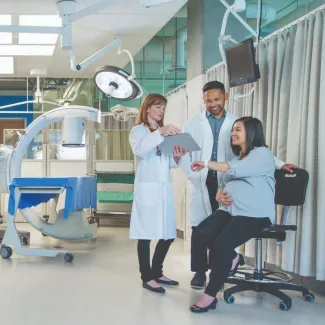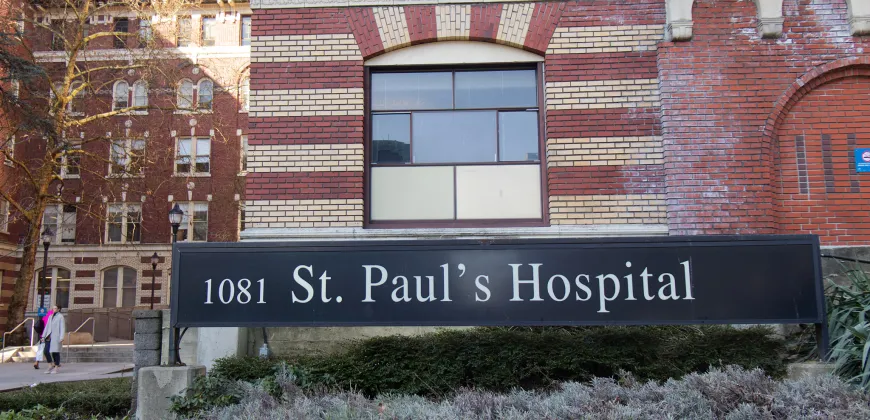Enhancing Online Curriculum for BC Educator Pathway Program

For their practicum, Jodi DenBok and Lee Stuardo, two students in the Master of Health Leadership & Policy in Clinical Education, evaluated one of the four levels of the province’s Educator Pathway Program. Their goal was to identify changes made to the program resulting from the shift to online learning during the pandemic and make recommendations for the program’s future direction.
The Educator Pathway Program is a province-wide professional development program offered to health-care providers who want to deepen their skills as mentors or who are clinical educators moving into or currently placed in educator roles. The second level of the program focuses on introducing new or somewhat experienced educators to basic education theory and practice so they have the confidence to plan and implement learner-centred education in a variety of clinical settings.
Historically, the level two program was offered in-person over eight instructional days. While the intent had always been to eventually offer the training online, the public health orders associated with COVID-19 made this happen that much faster.
“Before COVID-19, the level two module was delivered through eight full-day in-person sessions,” says Jodi. “When the course was shifted to an online format, facilitators needed to make changes to the content and teaching methods to accommodate online delivery. Each health authority was also acting independently because of different policies they had in place for the use of virtual platforms.”
The health authorities realized that this would be a good time to take stock of changes made to the Educator Pathway Program and explore recommendations to ensure the program continued to align with best educational practices.
Given the large scope of work involved, two practicum students were needed to conduct the review, and Lee and Jodi became the first students in the Clinical Education program to work on a practicum together.
The students met with their two mentors, one from the Provincial Health Services Authority and one from the Fraser Health Authority, to discuss the project goals. These included highlighting the work done by facilitators to shift to online delivery; identifying changes made to the structure of and resources in the curriculum as a result of the online delivery model; seeing how diversity, equity and inclusion in health care are addressed within the cohort; and recommending more up-to-date resources for the curriculum.
Jodi and Lee interviewed facilitators from Vancouver Coastal Health, Provincial Health Services, Fraser Health and First Nations health authorities to ask them about changes they made to the curriculum as part of the shift to online, the challenges they encountered and their goals for the evolution of the program. They read through the curriculum framework, facilitator guide and interactive syllabus, and they attended online sessions from each health authority as well as an in-person session at Vancouver Coastal to collect observational data.
“We ended up with an overwhelming amount of data,” says Lee. “We summarized the results using two types of data tables. The first was a list of details about content that had been added or removed as a result of the shift to online learning at each health authority. The second table addressed topics pertaining to our questions and themes.”
As part of their full report, the two students developed a set of research- and data-backed recommendations for the ongoing evolution of the program. While the results of their analysis and recommendations are currently under review by their practicum mentors, Lee and Jodi are hopeful that their recommendations will help support the continued growth and success of the program.
Reflecting back on their practicum experience, the two say that the process enabled them to make use of the knowledge and skills they acquired over the course of the postgraduate degree.
“It wasn’t just one course that informed this work,” says Jodi. “We were able to use knowledge from basically all our courses, while relying more heavily on topics covered in curriculum development, project management and leadership. We were also able to update the resource list for the Educator Pathway Program curriculum by drawing on resources we’d used in our classes.”
Lee advises that future Clinical Education students to take a proactive approach to their practicum placement. Students typically meet one-on-one with the Clinical Education program director to talk about their interests and goals, and this information is then used to match students to practicums that might be of particular interest to them. “However, if you have a workplace connection or topic in mind, you can seek it out and present it to Dr. Baumbusch,” says Lee.
“I had asked a colleague for practicum ideas and then met with Dr. Baumbusch for her input, which is how Jodi and I ended up working together on this project. This was a rewarding and meaningful practicum experience and I’m really proud of what we produced.”



